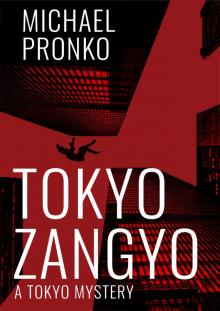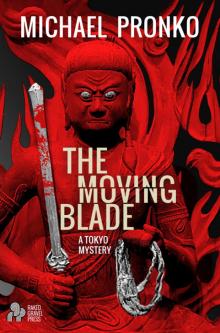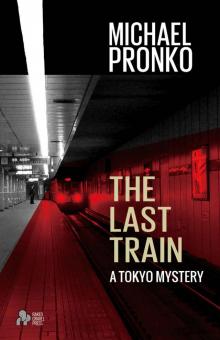- Home
- Michael Pronko
The Last Train (Detective Hiroshi Series Book 1) Page 2
The Last Train (Detective Hiroshi Series Book 1) Read online
Page 2
The elevator clanged open and carried him downstairs.
At the closest intersection, it took time to find a taxi. Buses and trains were no longer running, so taxis were the only way around. He stood in the rain waiting patiently for one to pass by.
Maybe he should give up the detective job and get on a plane to Boston to try working things out with Linda there. It wasn’t much of a job, tracking down investment scams, or much of a life drinking with Takamatsu, and standing in the rain to do it.
Everything was a trap if you looked at it closely—the boxes, framed photos, the apartment, his office. Sleeping in the office, on the sofa or waking up to take calls at all hours was like college dorm life, with the feeling that everything in life was still coming and nothing at all was yet settled.
Chapter 3
Hiroshi found Takamatsu standing in the middle of the large hall outside the stationmaster’s office, barking at two detectives half his age. They listened, eyes averted in deference, to the flow of commands. The two young detectives, energetic and smooth-faced, scurried off to carry out his orders.
Takamatsu waved his arm to sweep Hiroshi onto the escalator down to the platform, his gold cufflinks catching the light. Takamatsu’s elegant suits and silk ties did half his work for him. His way of speaking in the least polite Japanese did the other half.
“These guys are supposed to be finished,” said Takamatsu. “But this one took more time.”
“Who is supposed to be finished with what?” Hiroshi said, already exasperated.
“The cleanup squad.”
“Clean up?”
“Unrecognizable.”
“I’m here to recognize someone?”
“A foreigner.”
“How do you know if…?” Hiroshi asked.
“Blond hair.” Takamatsu lit a cigarette and looked at him. He straightened his cuffs.
“His hair could be dyed blond.”
“See, that’s why I asked you to come, to fill me in on these things.”
They walked along the platform, toward the end.
“The stationmaster’s worried about getting the trains going again. Doesn’t care about the dead man.” Takamatsu shook his head. “Sees them all the time, I guess.”
“They have their procedures.”
“Same as us.”
“Same as anyone.”
As they got closer, the breath started getting stuck in Hiroshi’s chest and he had to focus to exhale. He had examined dead bodies before, dragged along by Takamatsu to the pathology lab, but the chemical smell and bright lights sanitized the reality. A big white sheet over a washed body kept death covered and clean. As they walked down the platform, Hiroshi’s body tightened up.
“Sure seems like a foreigner. Fat. Fancy suit.”
“That could be anyone these days. Tokyo’s changed,” Hiroshi said.
“Yeah? Well, I don’t get out much.”
“Mended your ways?”
Takamatsu smiled and crushed out his cigarette. “Not enough.” He pointed to the “No Smoking” sign on the platform and blew out the last lungful.
They stopped at the far end of the platform.
“English meishi shop cards in his pocket,” Takamatsu said.
“Plenty of clubs have English cards these days,” Hiroshi said. “Lots of people speak English.”
“That’ll make it easy to find your replacement.”
Takamatsu hopped down onto the tracks and Hiroshi followed, each looking down the parallel, metal lines and wondering if the red signal light was enough to stop the trains from speeding into the station. Beyond the station, past the lights, the rails narrowed into the outer darkness.
Takamatsu and Hiroshi had to stretch out their arms for balance over the large chunks of gravel holding the rails and ties in place. The gravel chunks were larger than they appeared from the platform and shifted under each step.
Hiroshi looked back at the train conductors scurrying back and forth on the platform, shouting into hand-held microphones, trying to reorder the schedule.
Staple-shaped iron bars painted bright yellow were sunk into the concrete foundation of the platform to be used as steps or handholds. Beneath the platform was a crawl space just wide enough for a body.
A huge detective with a round head stood in the middle of the tracks. He was bent over, his giant belly hanging like a boulder he was used to carrying, scouring the gravel for clues.
“This is Sakaguchi,” Takamatsu said when they got close.
“The sumo wrestler?”
“Ex-sumo wrestler,” Sakaguchi replied politely.
“Takamatsu mentioned you,” Hiroshi said. “You used to be in homicide.”
“I’m helping out,” Sakaguchi said. “Temporarily.”
“Special call. Like you,” Takamatsu said. “Very special.”
Sakaguchi’s eyes, set deep inside the plump folds of his stoic, moon face, betrayed no emotion, though one of his eyebrows rose just a little. He was used to Takamatsu, too.
The cleanup squad in coveralls looked like puffed spacemen as they bent over the tracks and picked through the gravel with what appeared to be long chopsticks.
As Hiroshi looked closer, he could see them pinch up slivers of tissue, skin and bone and tuck them into clear plastic bags that swung with the rhythm of their work. One of the men stood up and twisted shut his oily, red-stained bag and nestled it inside the large black body bag, thick as a log, resting on the gravel. He shook open a fresh bag and bent back to work.
Sakaguchi’s bulk blocked a clearer view of the body bag. The force of the impact had thrown the body three meters beyond the end of the platform to where the body bag was set across the concrete ties that anchored the rails.
Takamatsu steered Hiroshi closer to the body, but Hiroshi looked down at the gravel, and behind him at Sakaguchi. Hiroshi looked away, looked back, turned away.
As they got close to the bag, Hiroshi looked in and stepped back. Through the open zipper, he could see clots of flesh and shredded clothing, a jutting bone and a severed tendon, a gold watch on a hairy arm.
“Where’s the train?” Hiroshi asked, looking around for it and breathing deep.
“They had to back it out and reroute it to get ready for the morning rush hour. It’s not going anywhere. We’ll check it later.”
The train conductors watched them work, chatting into their microphones, but said nothing to the detectives. No doubt Takamatsu had already warned them off. It was nearly four, so they had a lot of work to do to reset the precise order of the intricate system, minus the murder weapon train, before the morning rush hour.
“It was an express,” said Takamatsu.
“What?” Hiroshi shook his head.
“It shoots through here at top speed. This is the last local stop before Shinagawa.”
Hiroshi could hear the click of the giant chopsticks and leaned his arms on the concrete edge of the platform, distracting himself with billboard posters for a cute, teenage boy band and a new, romantic TV drama. In advertisements, everyone smiled and posed, silly with life and music and love.
“One hundred kilometers an hour.” Takamatsu said.
“That fast?” Hiroshi said, again reading over the details of the band and the drama.
“That’s a lot of metal to be going that fast so close to so much flesh.”
Sakaguchi stood beside him, visually scouring the area. He shrugged. “That’s about it.”
Hiroshi tried to picture where the man would have been standing. The timing to throw a body at just the right moment in front of a speeding train would demand sharp mental focus and plenty of physical strength. A moment too early or too late would mean missing it.
“Could be a suicide,” Hiroshi mused, and then wondered if that would be any easier to do.
“A foreigner wouldn’t know the train schedules,” Takamatsu said.
“Maybe someone told him,” Hiroshi offered.
“No foreigner would figure out this w
as the best place to kill himself. The trains, the times, it takes a bit of planning.”
“Maybe he was here by accident?”
“Why was he at the end of the platform?”
Sakaguchi spoke up, “That wide pillar blocks the driver’s view.”
“Perfect spot for murder,” Takamatsu said.
“Looks like suicide to me,” Hiroshi said.
Takamatsu shook his head. “Japanese are good at suicide, but not foreigners.”
“Nobody saw anything?” Hiroshi asked.
“Passengers this time of night tend to be drunk, half-asleep or texting.”
“The driver…?”
“Saw a blur and felt the thump. That’s it.”
“Closed-circuit cameras?”
“The bracket holding the camera drooped. Great shot of the floor. The camera outside showed a foreigner and a tall woman next to him, but just for an instant.”
“She was next to him?”
“Behind him. Might be with him. Might not. The shot was from behind.”
“So, it’s a suicide. Call the embassy.” Hiroshi wanted to go home and sleep.
Sakaguchi turned toward Takamatsu with the same unspoken question. His face looked like he could go either way—write it off or dig into it.
“Foreigners don’t commit suicide.” Takamatsu turned over a bloodstained chunk of gravel with his shoe. “Not in Tokyo, anyway.”
Hiroshi looked down at the stained gravel, wondering if that were true. When it came to foreigners, Hiroshi was never sure if Takamatsu was savvy or prejudiced—or both.
Takamatsu’s cell phone rang and Hiroshi took the chance to pull himself up to the platform. He leaned down to pull Takamatsu up by his free hand. Sakaguchi hoisted himself up and onto his feet as if he were the lightest of the three detectives, instead of a man carrying the combined weight of the other two.
At the end of the platform, the police photographer and her assistant worked with relaxed efficiency on the contents of the cadaver’s wallet and pockets. Purplish drops pooled in spots on the plastic sheet below the items carefully laid out as if for some gory picnic.
Blood had soaked into the pages of his leather-covered notebook and stained his thick fold of ten-thousand yen bills. An assistant nimbly turned over each item with chopsticks, as the cameraman snapped two shots of each.
Hiroshi leaned down to stare at the small stack of meishi name cards. They stank of blood and urine.
“Five are the same,” Hiroshi said, twisting his head to read. “Steve Deveaux, Bentley Associates, Consulting and Investing, Nishi-Shinjuku.” He looked up at Sakaguchi. “Must be him.”
Sakaguchi nodded.
Takamatsu shouted for everyone to finish up. The young detectives double-checked their notebooks and tried to look like they knew what they were doing, glancing around for orders to follow.
The squad on the tracks nestled their plastic bags and long chopsticks into a single large sack, and then zipped it shut. It took six people to hoist the bagged corpse onto the platform, and then on to the trolley. The squad visually checked the area again, pointing at spots one by one with white gloves to run through the checklist in their head.
The squad switched gloves and wiped the outside of the body bag with a clean, white cloth. The crew checked the zipper, sealed it with a plastic tie, plucked the trolley legs to waist height, and rolled it toward the stairs.
As the body bag rolled past them, Takamatsu, Hiroshi, Sakaguchi, and the younger detectives all bowed their heads with their palms together in prayer. Each of the train workers folded their hands and bowed their heads as the body rolled down the platform, into the elevator and out to the waiting ambulance.
Takamatsu nodded the final OK and signaled the stationmaster who started talking excitedly into his walkie-talkie, checking his watch and waving the new printout of the redone schedule. A young worker splashed a bucket of water over the platform and broomed it over the side. He sloshed another bucketful of water over the gravel, but it was not enough, so he went back for more.
“Let’s get a drink, huh?” said Takamatsu.
Sakaguchi said, “I have to be in the office before rush hour.”
“Those chikan train molesters start early?” Takamatsu joked.
Sakaguchi squeezed his eyes to a single line.
“You won’t be over there forever,” Takamatsu said.
Sakaguchi cleared his throat.
“We’ll put the unit back together again. And we’ll have some English help next time,” Takamatsu gestured toward Hiroshi.
Sakaguchi nodded and walked off to the taxi line. His white shirt, big as a bed sheet, shone over his massive back. He fit himself inside a taxi and was gone.
Hiroshi and Takamatsu walked off into the night toward the small lanes of bars and eateries. Behind them in the station, workers in white gloves hurried to restore order before the first train of the morning.
Chapter 4
Away from the station, Takamatsu lit a cigarette. “That smell,” he said inhaling deeply.
Hiroshi tried to keep all his senses in check.
“I know a little place close by here,” Takamatsu said.
Hiroshi put up his umbrella.
Takamatsu ignored the rain, and flipped up the collar of his silk jacket.
On the small streets farther from the station, the interior lights of convenience stores and gyudon rice-and-meat shops spilled onto the wet pavement like shards of a shattered mirror. A motorcycle shot by. Faint lights glowed from small snack shops and standing bars.
“I guess you’re going to dump the contents of his wallet on me?” Hiroshi asked.
“They’re all in English. A notebook and some documents, too.”
“There are people to do that, you know.”
“No one as good as you. Why do you think I got you the job in the first place?”
“Tell me again.”
“Crime’s globalizing. Hiring you was easier than learning English myself.”
“I thought I was hired to drink with you?”
“That, too. There’s also his cell phone messages.”
“Messages? That’ll take ages.”
“Think how long it would take me.”
“I have a lot of other cases.”
“The encryption guys should have the password cracked by morning. They get paid double what we make.”
Takamatsu made several turns, each street narrower than the last to where the street was so narrow they had to walk single file, as if already inside.
“It looks like a suicide.”
“How things look and how they are…” Takamatsu shrugged.
“I’m supposed to be money transfers, accounting blackmail, investment scams…”
“Yes, yes and chatting with the Interpol guys. Strictly speaking, you are inside the homicide department.”
“Eventually, I’ll be moved to my own department,” Hiroshi sighed and stopped.
Takamatsu turned back to him. “Eventually, but not today. Anyway, we’ll soon find he’s been killed for money. Money’s your area.”
“How do you know?”
“A guy like that is all about money.”
“A guy like what?”
“Dressed like that with a pretty woman late at night.”
“You’re not even sure she was with him. And you only saw her for an instant. From behind.”
“Every woman in Tokyo looks great from behind.”
“Is that the kind of thinking you use to solve cases?”
“You have to think more like a Japanese. You were in America too long.” Takamatsu started walking again, turned two more corners, and ducked under an overhanging sign into an even narrower alleyway.
“I’ve already got extra budget,” Takamatsu said, clipped and confident. “First thing I made sure of.”
“From where?”
“The up-and-ups want anything with a foreigner solved quick and quiet.” Takamatsu stopped and turned back to Hiroshi
. “Also, this isn’t the first foreigner to end up like this.”
“Like what?”
“Killed by a train. There were others.”
Hiroshi scoffed. “You think they’re connected because they’re foreigners?”
“I know so.”
“How many others?”
“Depends on how you count.”
Before Hiroshi could say anything more, Takamatsu grabbed a rough wooden handle jutting out from a wood-paneled wall under a large cedar ball. A section of the wall rolled sideways. It was an opening so low they had to bend over double and sidestep in. When they stood up inside, they were greeted by a booming, “Irrashaimase!” from the master, who reached up to turn down the volume on the television. There were no other customers.
Takamatsu apologized with slyly exaggerated excuses for not having come for a long time and introduced Hiroshi to the master with formal language. Hiroshi bowed. Takamatsu hung his jacket on a hook and loosened his tie as if he owned the place. He slicked back his hair, which hung to his collar, and rolled up his sleeves with three crisp folds.
Takamatsu checked his cell phone for messages, took off his watch and slipped them both into his jacket, settling astride one of the large cuts of log topped with thick indigo cushions that served as stools.
From a small warmer, the master drew out two steaming-hot white towels with tongs. After wiping their faces and hands with the towels, Hiroshi un-cricked his back and Takamatsu stretched his neck and shoulders in circling motions.
“You always…” Hiroshi said, but Takamatsu shushed him.
“Now is the time to reflect,” he said in a soft voice.
Hiroshi rolled his eyes and let out a sigh. He breathed in and leaned back as if just sunk into a hot bath.
The master leaned over the counter to set teensy dishes of pickled vegetables—crinkled and vinegary—on the counter. He fired up one of the small gas burners under a large pot of miso soup and wiped down the wooden cutting board. He cleaned his long sushi knife with a white towel.
The master pulled back a brown curtain over a glass-sided refrigerator filled with sake bottles. He pulled out two small chilled glasses from the top shelf and set these on the upper counter inside small, square, cedar wood boxes.

 Tokyo Zangyo
Tokyo Zangyo The Moving Blade
The Moving Blade The Last Train (Detective Hiroshi Series Book 1)
The Last Train (Detective Hiroshi Series Book 1)